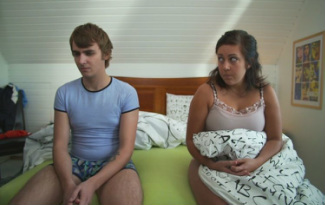The detriments of "Sex Ed" in its current state
Do you remember your sex education during your youth? Did you even have sex education?
My school district (a local, public school district composing of four small townships) contracted out our sex education through Catholic Charities, which would come into health classes and teach “sex ed.” (Note: I am very conscientious of using quotations around my experience of “sex ed” because it wasn’t real sexual education, but rather, (heteronormative) abstinence only education.) We started having exposure to sex ed as early as sixth grade, but the “real” sex ed really started in eighth to ninth grade. Boys and girls were separated in two different rooms to talk about their own bodies separately, and would come together where they (at least in my interpretation) tried to scare us into submission.
I remember especially this one part of the instructors’ routine that they did starting as early as sixth grade where each person was a little piece of paper. The instructor would fold them together to symbolize two people together sexually. Then she would set it on fire, as if their relationship would go up in flames. Then she would do it again, but put some liquid on them to symbolize the protection of marriage, and when the flame would come to the paper, it would burn. All this was to say that only marriage can protect individuals when it comes to sex. AND at the end of our “education,” we received a discount card to keep in our wallets if, and only if, we took (literally signed a contract!) a pledge of abstinence until marriage that could be used at the movie theatre and other local shops. Eleven years later, and that’s pretty much all that stuck with me.
I took a quick poll on my Facebook when I decided to write this post, asking my high school friends that I’m still in contact with what they remember. One friend stated that she remembered being taught a lot about STDs, the failure rates of contraceptives (not how to use them per se), and, in her words, “If you don’t have your virginity to give to your husband, what are you gonna give him? A sweater?” Another friend recalls that to avoid “temptation” we should avoid all forms of physical intimacy until marriage because “deep kissing” could lead to more. And a third friend recalls a lesson learned: “I had to balance a broom upside down on my palm either looking up “at my future” or only at the base “focusing on the present” which I guess meant instant gratification. Much easier to focus ON THE FUTURE which somehow was supposed to mean abstinence was the way to go..”
What is even more telling, though, is what we are not told in this supposed education. We were not told on how to use contraceptives or their acquisition, parts of the body, non-heterosexual sex or sexuality (I choose to state this because there are more than binary sexual formations of heterosexual or same-sex sex between individuals). Especially in a high school where we had eight pregnant freshman one year, maybe, just maybe, the abstinence only education wasn’t working (not to forget the lack of education about resources or solutions to the “negative outcomes” of sex, as if we were forever doomed). What about the positive benefits of sex, like it feels good?
This past week, John Oliver posted a video on Sex Education and its current state in the United States, embedded below. He highlights that only 22 states mandate sex education, and only 13 of those states require medically accurate sex education (where he makes a joke that we wouldn’t allow other subjects like history to be inaccurate… that’s a whole different blog post). While I may not necessarily advocate for core curriculums, the wide variability of sexual education curriculums from school to school, district to district, state to state is a serious concern, especially when we put our money and faith in an institution that is supposed to prepare the future generations for life. While I may be able to tell you the chemical formula for some inorganic compound, I left high school not knowing about my own anatomy and actually ashamed and scared of my body.
[youtube]https://www.youtube.com/watch?v=L0jQz6jqQS0[/youtube]
While there are a lot of issues surrounding the sad state of sexual education, there is a core element that always strikes me: the devaluation and subordination of female-bodied, and what is considered non-masculine, individuals. Throughout this entire line of thought is the argument that women’s value is based on their sexuality, whether they are pure and pious and good. In fact, a whole enterprise is built upon these values including purity balls, pledges, and rings; abstinence only education; and the feminine “hygiene” market. And yet, on the flip side we are bombarded with images and ideas that women cannot be too pious or pure, and in fact women become solely sexual commodities. Women, then, are not whole beings, but are simply reduced to the anatomy that lies between their legs. Women are also then held responsible for their actions as well as the actions of others (see my previous post on teaching men not to rape). This social phenomenon around women’s virginity, for which there is no medical standard definition, remains a social construct to keep women locked in a heteronormative patriarchy, not to mention how feminine presenting men, masculine presenting women, or ambiguous or non-binary individuals are punished/erased due to their non-conformance to this standard. Jessica Valenti, in her book The Purity Myth, writes, “It’s this inextricable relationship between sexual purity and women– how we’re either virgins or not virgins- that makes the very concept of virginity so dangerous and so necessary to do away with” (p.21). That is what is scary and damaging (see 12:00 in the video for more about double standards and placing the blame on women, and its consequences, especially surrounding sexual assault).
I’m not against waiting to have sex. I’m also not against having sex. I’m against the valuation of women on the basis of whether or not they have sex. I’m against the erasure of other components of sexuality and other sexual arrangements because they do not fit the normative standard. I’m against teaching people that they are worth less than others because they felt the need to express themselves in a different way. I’m against having only having one form of education, one strong bias against sex, as the reality is people have sex. People like having sex. Not teaching about sex, or teaching not to have sex or teaching inaccurate information about sex doesn’t work (think about staggering rates of assault, especially on college campuses). Sex ed can work, but it has to be done well and accurately. The John Oliver video above is a great stepping stone in explaining these issues (and discusses many that I don’t touch upon), but only begins to touch the larger, intersecting issues surrounding non-heterosexuality and non-normative genders, women’s subordination, menstruation and anatomy, heterosexism, etc. My “sex ed” was more a lack of, or negative, education, where I would have been “better off absent for the day” (via Oliver’s video).
Pieces to Read:
Valenti, Jessica. 2009. The Purity Myth. Seal: Berkeley.
Stein, Elissa and Susan Kim. 2009. Flow. New York: St. Martin’s.






